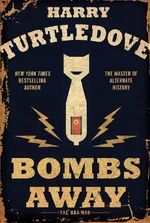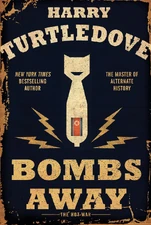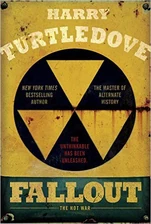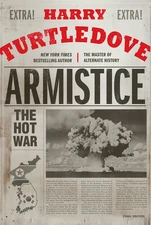(some additions) Tag: sourceedit |
No edit summary |
||
| (9 intermediate revisions by 5 users not shown) | |||
| Line 6: | Line 6: | ||
|ImageSize = 150px|followed_by = [[Fallout]]|cover_artist = Dmitri Ezepov}}'''''Bombs Away''''' is the first volume of a projected [[alternate history]] series, [[The Hot War]], in which [[Atomic bomb (The Hot War)|atomic weapons]] are used during the [[Korean War (The Hot War)|Korean War]], leading to the outbreak of [[World War III (The Hot War)|World War III]]. It was released on July 14, 2015.<ref>http://www.randomhouse.com/book/237690/bombs-away-by-harry-turtledove</ref> |
|ImageSize = 150px|followed_by = [[Fallout]]|cover_artist = Dmitri Ezepov}}'''''Bombs Away''''' is the first volume of a projected [[alternate history]] series, [[The Hot War]], in which [[Atomic bomb (The Hot War)|atomic weapons]] are used during the [[Korean War (The Hot War)|Korean War]], leading to the outbreak of [[World War III (The Hot War)|World War III]]. It was released on July 14, 2015.<ref>http://www.randomhouse.com/book/237690/bombs-away-by-harry-turtledove</ref> |
||
| − | The novel begins on November 23, 1950, after [[China (The Hot War)|Chinese]] forces have intervened in the Korean War. In [[OTL]], Chinese troops were able to encircle UN forces at the [[Chosin Reservoir (The Hot War)|Battle of Chosin]], but the [[United Nations (The Hot War)|UN]] forces were able to break out and evacuate [[North Korea (The Hot War)|North Korea]] in good order. In ''Bombs Away'', the Chinese appear to have been much more aggressive early on, with the result that about three UN divisions are encircled and systematically destroyed over the closing weeks of November and into December, despite [[United States (The Hot War)|U.S.]] efforts to provide air support |
+ | The novel begins on November 23, 1950, after [[China (The Hot War)|Chinese]] forces have intervened in the Korean War. In [[OTL]], Chinese troops were able to encircle UN forces at the [[Chosin Reservoir (The Hot War)|Battle of Chosin]], but the [[United Nations (The Hot War)|UN]] forces were able to break out and evacuate [[North Korea (The Hot War)|North Korea]] in good order. In ''Bombs Away'', the Chinese appear to have been much more aggressive early on, with the result that about three UN divisions are encircled and systematically destroyed over the closing weeks of November and into December, despite [[United States of America (The Hot War)|U.S.]] efforts to provide air support. |
| + | As is typical for Turtledove's multivolume works, the narration of ''Bombs Away'' is told through several POV characters. [[Cade Curtis]], a U.S. soldier who is caught behind enemy lines at Chosin, and begins making his way south. [[President of the United States (Other Presidents)|President]] [[Harry Truman (The Hot War)|Harry Truman]], the novel's only historical POV, authorizes MacArthur to use atomic bombs against China proper if it is the only way to improve the situation. |
||
| ⚫ | The U.S. launches its attack in [[Manchuria (The Hot War)|Manchuria]] on January 23, 1951. On February 1, the [[Soviet Union (The Hot War)|Soviet Union]] attacks [[Britain (The Hot War)|Britain]], [[France (The Hot War)|France]], and [[West Germany (The Hot War)|West Germany]] |
||
| − | + | While the situation deteriorates, various civilian and military POVs have their destinies shifted. Soviet tank commander [[Konstantin Morozov]] is moved to [[East Germany]], as is [[Hungary (The Hot War)|Hungarian]] soldier [[Tibor Nagy]]. [[West Germany (The Hot War)|West German]] vet [[Gustav Hozzel]] sees the U.S. military mobilize in [[Fulda (The Hot War)|Fulda]]. [[Ihor Shevchenko]], a [[Ukraine (The Hot War)|Ukrainian]] vet, worries that he'll be taken from his collective farm. Soviet pilot [[Boris Gribkov]] is moved to [[Provideniya (The Hot War)|Provideniya]]. U.S. pilot [[Bill Staley]], stationed in [[South Korea (The Hot War)|South Korea]], is soon tasked with carrying atom bombs. His wife, [[Marian Staley|Marian]] raises their daughter, [[Linda Staley|Linda]] in [[everett (The Hot War)|Everett, Washington]], and tries not to worry too deeply about her husband. In [[glendale (The Hot War)|Glendale, California]], [[Aaron Finch]] works as an appliance delivery man. [[britain (The Hot War)|English]] widow [[Daisy Baxter]] runs her pub, as the global situation reminds of the days leading up to [[World War II (The Hot War)|World War II]]. |
|
| ⚫ | The U.S. finally launches its attack in [[Manchuria (The Hot War)|Manchuria]] on January 23, 1951. One of its survivors is [[Vasili Yasevich]], a Russian expat residing in [[Harbin]]. On February 1, the [[Soviet Union (The Hot War)|Soviet Union]] attacks [[Britain (The Hot War)|Britain]], [[France (The Hot War)|France]], and [[West Germany (The Hot War)|West Germany]], triggering the [[NATO (The Hot War)|NATO]] treaty. For the next several weeks, the U.S. and the USSR exchange tit-for-tat bombings of strategic possessions in their respective territories, including attacks in various Soviet satellites, until the USSR and it satellites launch an invasion into Western Europe, beginning World War III. |
||
| − | In response, the United States launches a full scale nuclear attack on the Soviet Union; In the West, [[Moscow (The Hot War)|Moscow]], [[Leningrad (The Hot War)|Leningrad]], [[Kiev (The Hot War)|Kiev]], [[Minsk]] and a number of other cities are destroyed by Atomic bombs. In the East, American nuclear attacks just as devastating; [[Vladivostok (The Hot War)|Vladivostok]], [[Yuzhno-Sakhalinsk (The Hot War)|Yuzhno-Sakhalinsk]], [[Magadan]], [[Petropavlovsk-Kamchatsky]] and [[Provideniya]] are among the cities destroyed, although a significant number of American bombers are lost in these attacks. In an attempt to decapitate the Soviet leadership, Moscow is hit with three atomic bombs, devastating the city and vaporizing the [[Kremlin]] and the Lubyanka. Although many commissars and generals are killed in these strikes, Stalin manages to escape to [[Kuibishev (The Hot War)|Kuibishev]] where he continues overseeing the war effort. |
||
| + | On March 2, 1951, the Soviets are able to stage atomic bombings along the entire U.S. west coast and interior, destroying several key cities. Boris Gribkov's crew targets [[Seattle (The Hot War)|Seattle]], and winds up being the only crew to return home. His bomb also destroys nearby Everett. Marian and Linda Staley survive, but lose their home and are forced in to a [[Camp Nowhere|refugee camp]]. Aaron Finch witnesses the atomic attack on [[Los Angeles (The Hot War)|Los Angeles]], but Glendale isn't harmed. He becomes a minor hero when he captures a [[yuri Svechin|Soviet]] pilot who'd parachuted over the city. |
||
| ⚫ | In the meantime, the land war in [[Europe (The Hot War)|Europe]] is initially successful for the Soviets, as they overrun Austria, and push into northern Italy. Allied forces in West Germany are in a constant state of retreat throughout the spring and into summer. |
||
| + | In response, the United States launches a full scale nuclear attack on the Soviet Union. This includes an attempt to decapitate Soviet leadership by destroying [[Moscow (The Hot War)|Moscow]] along with numerous other cities. Stalin manages to escape to [[Kuibishev (The Hot War)|Kuibishev]] where he continues overseeing the war effort. Another key city the U.S. destroys is [[kiev (The Hot War)|Kiev]], completely upending Ihor Shevencko's life. |
||
| ⚫ | |||
| ⚫ | In the meantime, the land war in [[Europe (The Hot War)|Europe]] is initially successful for the Soviets, as they overrun [[Austria (The Hot War)|Austria]], and push into northern [[Italy (The Hot War)|Italy]]. As seen through the eyes of several POVs, Allied forces in West Germany are in a constant state of retreat throughout the spring and into summer. For the time being Truman decides not to use nuclear weapons over West Germany or the major cities of Eastern Europe, as Truman hopes that the war will eventually lead to rebellions within the Soviet satellite states. |
||
| − | With neither side willing to back down, and with the looming development of far more powerful Thermonuclear weapons, civilians, soldiers and politicians on both sides wonder how much, if any, of the world will be left by the time the war ends. |
||
| ⚫ | In April 1951, the Soviet Union detonates bombs in the [[Panama Canal (The Hot War)|Panama]] and [[Suez Canal (The Hot War)|Suez Canals]]. Boris Gribkov gets another city under his belth, the time [[Bordeaux (The Hot War)|Bordeaux]]. The Soviets also conventional explosives against air fields in Britain. The United States responds by stepping up its nuclear campaign against the Soviet Union. With neither side willing to back down, civilians, soldiers and politicians on both sides wonder how much, if any, of the world will be left by the time the war ends. For Tibor Nagy, the war ends in a German field. He's replaced by [[Isztvan Szolovits]] as POV. |
||
| ⚫ | The novel ends with the U.S. military efforts in Western Europe in dire straits, as the Red Army continues to advance through West Germany and towards the French border, despite taking heavy losses. For the Soviets, critical damage to the [[Trans-Siberian railroad]] system and the destruction of almost all of their major cities (with the Americans targeting even more cities as the war continues) hampers Soviet war efforts as their economy and |
||
| + | |||
| ⚫ | The novel ends with the U.S. military efforts in Western Europe in dire straits, as the Red Army continues to advance through West Germany and towards the French border, despite taking heavy losses. For the Soviets, critical damage to the [[Trans-Siberian railroad (The Hot War)|Trans-Siberian railroad]] system and the destruction of almost all of their major cities (with the Americans targeting even more cities as the war continues) hampers Soviet war efforts as their economy and infrastructure are strained to the breaking point. Even old veterans like Ihor Shevchenko are no longer safe from conscription. |
||
| + | |||
| + | The Korean War has became a sideshow, with both sides having their supply-lines heavily damaged. Cade Curtis has made it back to enemy lines and is a rising star thanks to attrition. Bill Staley isn't so lucky, being shot down over the U.S.S.R. |
||
| + | |||
| + | As the first volume ends, Boris Gribkov drops an atom bomb in [[Paris (The Hot War)|Paris]]. |
||
==References== |
==References== |
||
{{reflist}} |
{{reflist}} |
||
| − | |||
{{The Hot War}} |
{{The Hot War}} |
||
[[Category:2015 Works]] |
[[Category:2015 Works]] |
||
| Line 34: | Line 39: | ||
[[Category:Works Set in France]] |
[[Category:Works Set in France]] |
||
[[Category:Works Set in Germany]] |
[[Category:Works Set in Germany]] |
||
| ⚫ | |||
[[Category:Works Set in Japan]] |
[[Category:Works Set in Japan]] |
||
| ⚫ | |||
[[Category:Works Set in the Soviet Union]] |
[[Category:Works Set in the Soviet Union]] |
||
[[Category:Works Set in Ukraine]] |
[[Category:Works Set in Ukraine]] |
||
[[Category:Works Set in the United States]] |
[[Category:Works Set in the United States]] |
||
| ⚫ | |||
| ⚫ | |||
Revision as of 09:32, 23 August 2020
| Bombs Away | |
|---|---|
 | |
| Author | Harry Turtledove |
| Cover artist | Dmitri Ezepov |
| Publisher | Del Rey |
| Publication date | July 14, 2015 |
| Followed by | Fallout |
Bombs Away is the first volume of a projected alternate history series, The Hot War, in which atomic weapons are used during the Korean War, leading to the outbreak of World War III. It was released on July 14, 2015.[1]
The novel begins on November 23, 1950, after Chinese forces have intervened in the Korean War. In OTL, Chinese troops were able to encircle UN forces at the Battle of Chosin, but the UN forces were able to break out and evacuate North Korea in good order. In Bombs Away, the Chinese appear to have been much more aggressive early on, with the result that about three UN divisions are encircled and systematically destroyed over the closing weeks of November and into December, despite U.S. efforts to provide air support.
As is typical for Turtledove's multivolume works, the narration of Bombs Away is told through several POV characters. Cade Curtis, a U.S. soldier who is caught behind enemy lines at Chosin, and begins making his way south. President Harry Truman, the novel's only historical POV, authorizes MacArthur to use atomic bombs against China proper if it is the only way to improve the situation.
While the situation deteriorates, various civilian and military POVs have their destinies shifted. Soviet tank commander Konstantin Morozov is moved to East Germany, as is Hungarian soldier Tibor Nagy. West German vet Gustav Hozzel sees the U.S. military mobilize in Fulda. Ihor Shevchenko, a Ukrainian vet, worries that he'll be taken from his collective farm. Soviet pilot Boris Gribkov is moved to Provideniya. U.S. pilot Bill Staley, stationed in South Korea, is soon tasked with carrying atom bombs. His wife, Marian raises their daughter, Linda in Everett, Washington, and tries not to worry too deeply about her husband. In Glendale, California, Aaron Finch works as an appliance delivery man. English widow Daisy Baxter runs her pub, as the global situation reminds of the days leading up to World War II.
The U.S. finally launches its attack in Manchuria on January 23, 1951. One of its survivors is Vasili Yasevich, a Russian expat residing in Harbin. On February 1, the Soviet Union attacks Britain, France, and West Germany, triggering the NATO treaty. For the next several weeks, the U.S. and the USSR exchange tit-for-tat bombings of strategic possessions in their respective territories, including attacks in various Soviet satellites, until the USSR and it satellites launch an invasion into Western Europe, beginning World War III.
On March 2, 1951, the Soviets are able to stage atomic bombings along the entire U.S. west coast and interior, destroying several key cities. Boris Gribkov's crew targets Seattle, and winds up being the only crew to return home. His bomb also destroys nearby Everett. Marian and Linda Staley survive, but lose their home and are forced in to a refugee camp. Aaron Finch witnesses the atomic attack on Los Angeles, but Glendale isn't harmed. He becomes a minor hero when he captures a Soviet pilot who'd parachuted over the city.
In response, the United States launches a full scale nuclear attack on the Soviet Union. This includes an attempt to decapitate Soviet leadership by destroying Moscow along with numerous other cities. Stalin manages to escape to Kuibishev where he continues overseeing the war effort. Another key city the U.S. destroys is Kiev, completely upending Ihor Shevencko's life.
In the meantime, the land war in Europe is initially successful for the Soviets, as they overrun Austria, and push into northern Italy. As seen through the eyes of several POVs, Allied forces in West Germany are in a constant state of retreat throughout the spring and into summer. For the time being Truman decides not to use nuclear weapons over West Germany or the major cities of Eastern Europe, as Truman hopes that the war will eventually lead to rebellions within the Soviet satellite states.
In April 1951, the Soviet Union detonates bombs in the Panama and Suez Canals. Boris Gribkov gets another city under his belth, the time Bordeaux. The Soviets also conventional explosives against air fields in Britain. The United States responds by stepping up its nuclear campaign against the Soviet Union. With neither side willing to back down, civilians, soldiers and politicians on both sides wonder how much, if any, of the world will be left by the time the war ends. For Tibor Nagy, the war ends in a German field. He's replaced by Isztvan Szolovits as POV.
The novel ends with the U.S. military efforts in Western Europe in dire straits, as the Red Army continues to advance through West Germany and towards the French border, despite taking heavy losses. For the Soviets, critical damage to the Trans-Siberian railroad system and the destruction of almost all of their major cities (with the Americans targeting even more cities as the war continues) hampers Soviet war efforts as their economy and infrastructure are strained to the breaking point. Even old veterans like Ihor Shevchenko are no longer safe from conscription.
The Korean War has became a sideshow, with both sides having their supply-lines heavily damaged. Cade Curtis has made it back to enemy lines and is a rising star thanks to attrition. Bill Staley isn't so lucky, being shot down over the U.S.S.R.
As the first volume ends, Boris Gribkov drops an atom bomb in Paris.
References
| |||||||||||||||||||||


